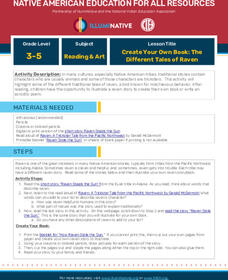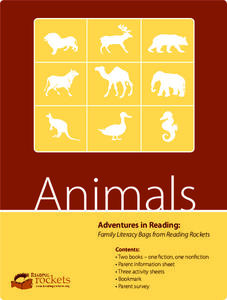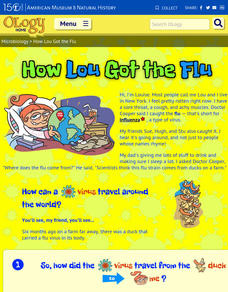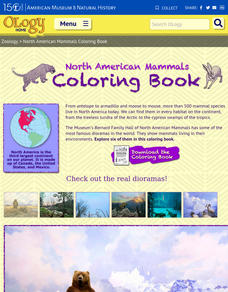Curated OER
Helpful Animals and Compassionate Humans in Folklore
Students define elements of stories from around the world that include helpful animals. They explore animal character motivations and use graphic organizers to compare and contrast animal stories from different cultures.
Curated OER
Isopod Behavior, of the Rolly Polly Lab
Students investigate the behavior of isopods. In this isopod lesson plan, students make observations of an isopod and sketch the pillbug. They study the orientation of the isopods in relation to moisture in a chamber they construct from...
Curated OER
Rainforest (Elementary, Social Studies)
Explore the rainforest with your class. Learners study the meaning of the word endangered, choose an animal to study, gather data, and discuss why the animal is in danger of extinction. This is a motivating way to have your class discuss...
Curated OER
Ecology Integration Using IMovie
Amazing! Any 5th grader would be more than willing to participate in this project. Students are broken into groups, each group reads one book from a list of five. They use their book as the basis for choosing an animal and environment to...
Curated OER
Desert Ecosystems
Introduce your class to the desert ecosystems using this colorful and informative presentation. This resource discusses desert plants and animals. It also identifies the deserts in the Southwest region of the United States. There are...
Curated OER
Create Your Own Book: The Different Tales of Raven
The raven is the focus of a lesson that examines trickster tales and the different stories about the bird. After listening to three tales about the raven, scholars pinpoint and discuss descriptive words. Pupils use one story to...
Mr. Nussbaum
Penguins
Penguins are the topic of an informational text that scholars read or listen to, then answer 10 multiple-choice questions.
Mr. Nussbaum
Arctic Fox
A short informative text shares details about the Arctic Fox. Scholars read or listen to the text then answer 10 multiple-choice questions.
PBS
Reading Adventure Pack: Sleep
A reading adventure pack features two stories—Time to Sleep by Denise Fleming and Animals Don’t Wear Pajamas by Eve Feldman. In response to reading the fiction and nonfiction texts, scholars create a dreamcatcher, discuss hibernation,...
Mr. Nussbaum
Lobsters
Lobsters are the topic of an informational text that scholars read then answer a series of questions. A progress report details their work.
PBS
Reading Adventure Pack: Animals
Scholars explore the animal kingdom with help from two texts, Blueberries for Sal by Robert McCloskey and A Bed for the Winter by Karen Wallace. The literature and informational text set the learning stage for thoughtful discussion and...
American Museum of Natural History
How Lou Got the Flu
Six questions probe participants to discover the possibility of catching a virus from others—even animals. Here, the influenza virus travels from duck to person in a round-about way. The quiz concludes with helpful tips to stay healthy.
American Museum of Natural History
What Do You Know About Horses?
A 10-question online quiz tests scholars' knowledge about horses: all answers come with an informative explanation.
American Museum of Natural History
Mammal Flipbooks
Scholars follow eight steps to create a flipbook and discover key facts about mammals' locomotion.
American Museum of Natural History
North American Mammals Coloring Book
Seven pages offer scholars the opportunity to learn about North American mammals and boost their coloring skills. Animals include brown bears, beavers, jackrabbits, wolves, jaguar, and Dall sheep
PBS
Plants Count
Changes to habitats mean changes to resources. Groups examine aerial maps to predict areas of low and high plant resources. After formulating a plan, they visit the areas to collect data about the plant resources and then share their...
American Museum of Natural History
Finding Fossils
How does one go about finding fossils? Find out with an informative webpage that looks at the digging process, showcases rocks and common fossils, helpful tips, and a list of archeological do's and don'ts.
Children’s Hospital of Philadelphia
Animal Research and Vaccines
Animals save lives. In small groups pupils research the role of animals in the development of vaccines. Each team investigates one disease to find out how the vaccine was developed and how animals played a role n the research. Groups...
Children’s Hospital of Philadelphia
Learning From Animals
Is all research on animals bad? Learners use a video to understand how animal research benefits humans. Pupils read about a drug modification turned deadly and the result of the 1938 Federal Food, Drug, and Cosmetic Act. Scholars use a...
NASA
Wetlands
Take a little wade in the wetlands. A fun unit has pupils conduct a literature review to learn how climate change and human actions affect wetland ecosystems. They take a trip to a wetland, observe the fauna and flora, and then take and...
Chicago Botanic Garden
Ecological Mismatches
Modeling is a powerful teaching tool. The final installment in a six-part series has pupils complete an activity to model a food web and discover the interconnected relationships in an ecosystem. They then read about changes in migratory...
National Wildlife Federation
Habitat Hunt
Put yourselves in their shoes—or, in this case, their paws. Learners assume the role of an animal and scan a habitat looking for features to fulfill their basic needs. Based on their findings, they decide if the habitat is a suitable...
National Wildlife Federation
Habitat for Sale
Where would this animal like to live? Pupils choose an animal and write an ad to advertise that animal's habitat or home. For a little fun, learners create the newspaper ads to provide enough detail for classmates to guess what animal...
California Education Partners
Quest for Tree Kangaroo
A three-day assessment challenges scholars to read a passage from an informational text then complete two activities that lead to a writing assignment. Day one and two begin as readers independently read a passage and tag the most...

























